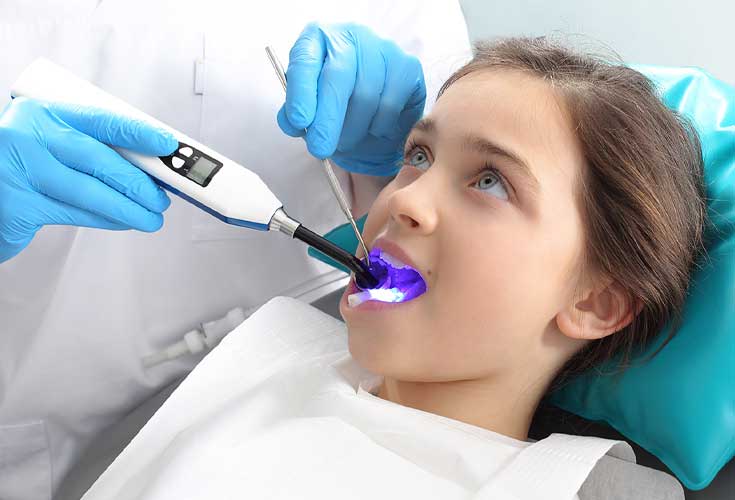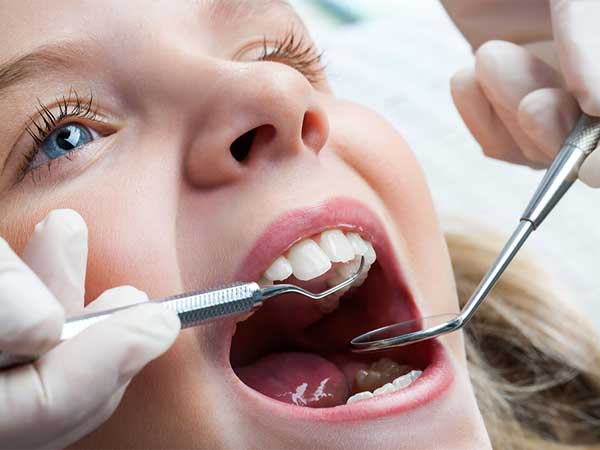Dental Fissure Sealants
What are dental fissure sealants?
First of all, dental fissure sealants are a protective plastic coating. Due to the fact that the back molars are more prone to cavities, the dentist applies it to the surfaces of the chewing teeth. Furthermore, these sealants similar to a white tooth filling and provide a hard shield that keeps food and bacteria from getting into the tiny grooves in the teeth. They prevent tooth decay and cavities.

Which teeth should be sealed?
The molars and premolars are the teeth that have ‘pits’ (small hollows) and ‘fissures’ (grooves) on their biting surfaces. Besides, our dentists will examine the teeth and check whether the fissures are deep enough to require a sealant. Only the teeth that have deep grooves will need to be sealed; while others that have shallow grooves will not need sealing.

When dental fissure sealants should be applied?
Because children find it difficult to clean food and bacteria stuck in the fissures of their teeth, it leads to decay and cavities. Dental fissure sealants fill in the pits and grooves. This helps to protect the teeth from plaque and decay. For best results, apply sealants as soon as the first permanent teeth start to come through the ages of six and seven. The remaining teeth that grow between the ages of 11 and 14 years are sealed as they appear. Also, this will prevent bacteria to set in and decay in the new tooth.
The procedure
Dental fissure sealants are painless, and easy to apply. Normally, it takes a few minutes per tooth and does not require anaesthetic. They are usually made of a white or clear plastic material.
The dentist will:
- Firstly, clean the tooth and dry it
- Secondly, prepare the tooth surface for bonding
- Thirdly, the fissures are filled with sealant and it is set using a special dental light
- Finally, check your bite and polish off any excess sealant


After the procedure
Maintain good oral hygiene, brush twice a day. You will find that it is easier to clean the teeth because the brush will reach all surfaces. Also, visit your dentist regularly for dental check-up. The dentist will check if the sealant is in good condition. Remember, sealants can sometimes fall down or it may wear out over the years and may require re-application.
Dental Fissure Sealants - FAQ
1. Will I feel any pain?
The procedure is totally pain free. You don’t feel the sealants while chewing or drinking afterwards.
2. How long do pit and fissure sealants last?
Even though Sealants last for many years, your dental team will still want to check them regularly to make sure that the seal is still intact. They can wear out over the years, and sometimes the dental team needs to add or replace some sealant to be sure that no decay can start underneath it. Please visit us at Rochedale Central Dentist for a regular dental check-up.
3. Do I still have to clean my teeth?
After the procedure, the smooth, sealed surface is easier to keep clean and healthy with brushing your teeth twice a day. It is important to maintain oral hygiene. You will find that it is easier to clean the teeth because the brush will reach all surfaces.

We Bulk Bill
We bulk-bill HICAPS, Kids eligible under child dental benefit scheme (CDBS), Veteran Affairs (DVA Gold Card), Emergency and General dental vouchers from QLD Government (Oral Health Services).
- HICAPS - for fast claims on the spot
- Veteran Affairs (DVA Gold Card) bulk billing options available
- Eligible kids are bulk-billed under Child Dental Benefit Scheme
- We accept general dental vouchers from QLD Government








